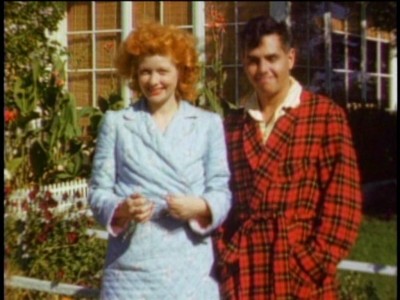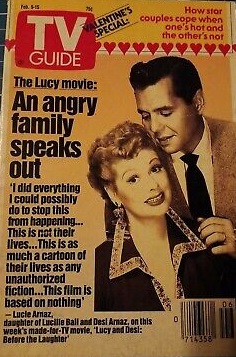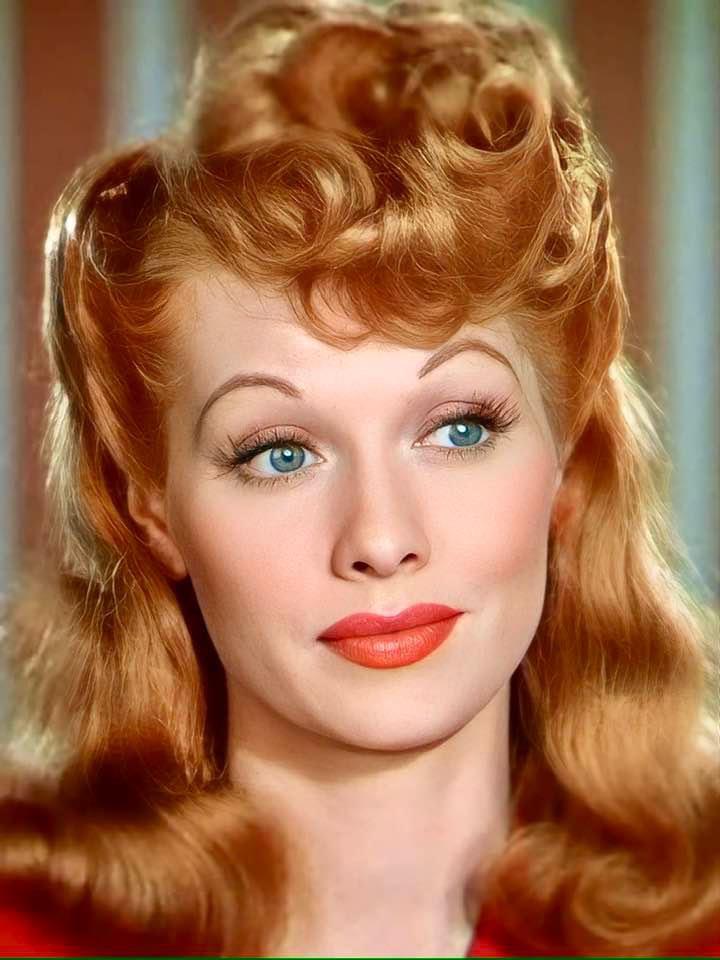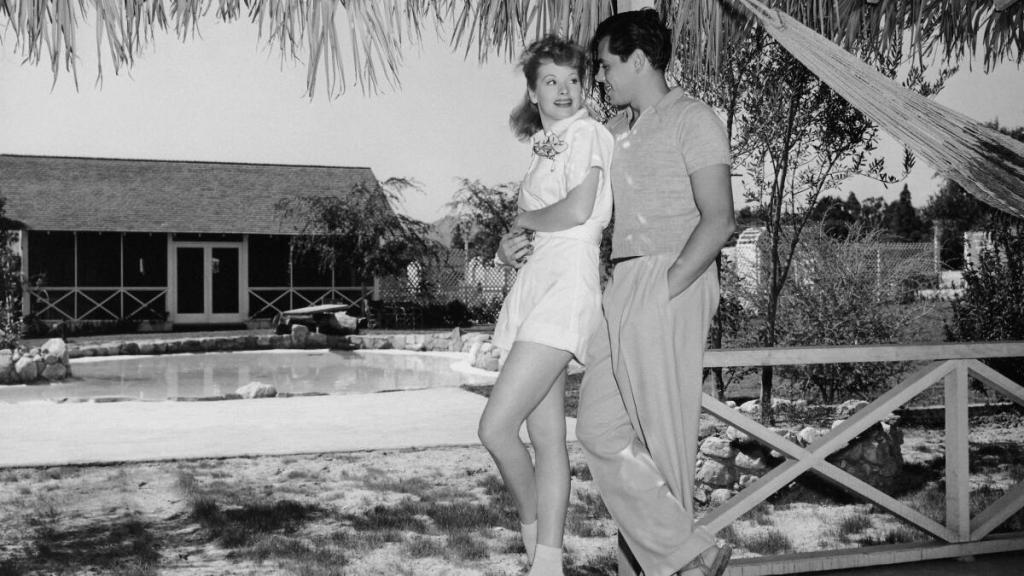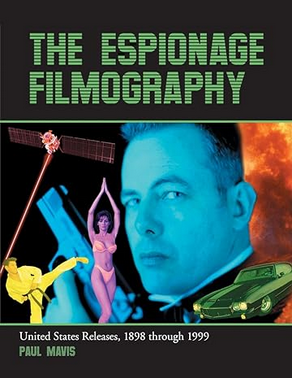I hadn’t realized that this past April was the 35th anniversary of the passing of Lucille Ball, television’s greatest comedienne. Probably because that former standby of media information—the old “TV listings”—hadn’t reminded me. Since traditional linear network TV is now essentially a niche joke—the last form of mass communication that actually helped unify our popular culture, as opposed to the internet and streaming, which have completely Balkanized it—I seriously doubt there was any kind of effort on the part of her old network, CBS, to commemorate her death while celebrating her legacy (maybe they did something on MeTV…do people still have cable?).
By Paul Mavis
So instead of flipping the dial (look it up), I went down to the vault and rummaged around for MPI Home Video’s DVD release of Lucy & Desi: A Home Movie, the 1993 TV documentary about the love story between Lucille Ball and Desi Arnaz, created, directed and hosted by their daughter, Lucie Arnaz. Utilizing never-before-seen (in 1993, at least) home movies of the couple during their first years of marriage, as well as interviews with close friends and family, Lucy & Desi: A Home Movie is certainly fascinating when it sticks to that footage (…and some of the interviews). Things get shaky, though, whenever Lucie Arnaz makes Lucy & Desi: A Home Movie into Lucie: A Home Movie About Me and Not My Famous Parents. According to Lucie Arnaz, the stated aim of Lucy & Desi: A Home Movie was to bring Desi and Lucy to life as people to the viewer, not as one-dimensional fictional characters with their worst traits emphasized for sensationalistic purposes. If that sounds to you like this doc was a response to something specific, you’re correct. In 1991, Arnaz went on the record that she was not at all happy with her mother’s home network, CBS, when they ran their own docudrama, the rather dour, grim Lucy & Desi: Before the Laughter, to coincide with the 40th anniversary of the creation of I Love Lucy (ten bucks says someone didn’t get a check…).
Click to order Lucy & Desi: Before the Laughter on DVD:
(Paid link. As an Amazon Associate, the website owner earns from qualifying purchases.)
After the CBS docudrama aired (to socko ratings), reels and reels of color home movie film were supposedly found by Lucie Arnaz, footage she had never watched before, chronicling her parents’ newlywed life at their first home: the so-called “Desilu Ranch” in Chatsworth, California, situated in the San Fernando Valley. Fascinated by the footage, Arnaz and her husband, actor Laurence Luckinbill, spent the next three years cataloging the footage, as well as tracking down family and friends to interview for this documentary. Once they had finished Lucy & Desi: A Home Movie, did they offer it to Lucy’s home base, CBS? Hell no—they sold it to NBC (Lucie Arnaz may not have inherited Lucille Ball’s genius for comedy, but she did inherit her mother’s steely ability to pay back a betrayal with a kick in the balls).
What I found most interesting about Lucy & Desi: A Home Movie—aside from just the fascination of watching candid color footage of Arnaz and Ball—was the sometimes surprising portrait painted of the two television icons, icons who have indeed been mythologized right out of any kind of three-dimensionality (what? You thought that agenda-driven Amy Poehler doc or that laughably shitty Aaron Sorkin mess starring goblins Nicole Kidman and Javier Bardem, were the first times the real Lucy and Desi were examined?).
For many fans like myself, despite their two big-screen color movies together, or Lucy’s later color series, or Desi’s appearances on Carson, Lucy and Desi occupy a black and white world in our collective memory, so strongly are they rooted in their I Love Lucy gestalt. So just seeing them prior to their starring roles in their ground-breaking sitcom, young and in love, clowning around in color in unscripted moments, is a surprisingly emotional experience (particularly when you see how apparent their love was for one another, after decades of hearing only about their later sparring and separation). Those silent 16mm sequences do more to “humanize” Lucille and Desi’s memories than all of Lucy & Desi: A Home Movie‘s subsequent interviews and Lucie Arnaz’s philosophizing combined.
With the nothing-short-of relentless repetition of the I Love Lucy shows during the period of time in which I grew up, it’s almost impossible to visualize the actors in my mind in any other form than as “the Ricardos.” This color home movie footage (and there is a copious amount of it in the documentary) goes a long way towards providing a visual “antidote,” if you will, for that later glorious (but also restrictive) aesthetic television framework put on the actors by their own iconic sitcom.
As for the portraits drawn of Lucy and Desi, while certainly no expert, I had read about both of them before, coming away with generalizations about Lucille’s controlling personality and Desi’s drinking problem. However, Lucy & Desi: A Home Movie goes quite a bit further, providing a much fuller (and sadder, in many ways) picture of Lucy and Desi as both individuals and as a couple.
RELATED | More 1990s TV reviews
I wasn’t aware that Lucy had such a harsh upbringing (her widowed mother essentially abandoned her as a child, an event that no doubt contributed to her well-earned “wild child” reputation), nor that this pattern would ultimately repeat itself when Lucy pushed off the raising of Lucie and Desi, Jr. onto her own mother (about as ironic as you can get) and various nannies and servants.
I had read that Desi was a drinker and a chaser, but the picture painted of him here (and perhaps it’s a too-forgiving one by a loving daughter) is that of a multi-talented performer who was far more lively and funny off camera than his world-famous comedienne wife (Lucy is described as “on” for visitors, but decidedly “off” with the family), but who was also haunted by a strained relationship with his parents.
I always loved to see Desi whenever he appeared on Carson (a few clips of those appearances show up here); he always came over as a hell of an entertaining guy, with a natural warmth and ease and charm—along with a beautiful sense of comedic timing—that connected directly with the viewer (it’s a crime that he was either unable to or uninterested in pursuing separate comedic roles). And, according to Lucy & Desi: A Home Movie, that’s just the way he was in real life, as well. Lucy, in her talk show appearances, however, would often times come over as either too “on,” or overly serious and professional and brittle. But although Lucy & Desi: A Home Movie is quite good at giving us glimpses of Lucy’s and Desi’s personalities we may not have known about, it also raises sometimes uncomfortable issues it then chooses to gloss over, or ignore. Much is made of Lucy’s brush with McCarthyism, when she was labeled a Red (and when the matter, rather mysteriously, just faded away). However, not much is explained as to how this matter was resolved, nor more importantly, just what were her politics (she was raised a socialist by her grandfather, and was, at one time, a registered Communist—although she and Desi stated this was done purely for form’s sake to please her grandfather. Which I ain’t buying, nor did a lot of other people, back when this originally played out).
The documentary goes into detail about Lucy’s upbringing, her modeling career, and her first Hollywood gig (appearing as a poster girl for Eddie Cantor’s Roman Scandals), but then it leapfrogs right to her becoming the “Queen of the B’s” at RKO. How did she go from anonymous extra to landing a contract at RKO? The doc doesn’t say (you can guess, though, when you see those gams…).
As for Desi, perhaps the most significant flaw in his character—his womanizing—is mentioned as it pertains to hurting Lucy (she was emotionally devastated the first time it happened, eventually becoming bitter and hard about its inevitability as the years progressed). But as to exploring why Desi did this, and how he felt, perhaps, in hurting Lucy this way, those themes are left largely unexplored. A few times an interviewee or Lucie Arnaz explains that he was “Latin” (as if that stereotype was enough of an excuse) and leaves it at that.
For such a critical schism in their marriage and combined careers, such a flaw would seem to demand more exploration—particularly since Lucie Arnaz brings it up in the first place. One gets the feeling, though, that Desi’s essentially more upbeat personality—as well as Lucie’s obvious love for him, and her troubled connection with her mother—earns him a “pass” here in comparison to the relatively harsh assessments directed at Lucy.
Where Lucy & Desi: A Home Movie falters the most is whenever Lucie Arnaz allows the documentary to focus on her feelings concerning her famous parents, rather than sticking to the subject at hand: Lucy and Desi. While her stated aim to “search” to find a “true” portrait of her parents is compelling, along with the obvious heartache she carries from what must have been a troubled childhood…at best, frankly, the viewer isn’t as concerned with her plight. Not to sound cruel or indifferent, but most viewers who pick up Lucy & Desi: A Home Movie want to understand Lucy and Desi…not Lucie Arnaz.
Her interview scenes feel far too calculated, too “on” to come off sincerely; one watches them and begins to feel that Lucie wanted this documentary to be about her famous parents’ image, filtered through her feelings, her disappointments, her pain. That’s certainly a valid approach to any documentary exploring child/parental relationships, but Lucie Arnaz just doesn’t come across as someone who’s doing this only to come to some kind of understanding: the documentary as self-help tool.
One gets the feeling she’s long ago figured out this relationship, and this documentary is more about attracting personal attention for the former actress (particularly during her embarrassing readings of her parents’ love letters), rather than as a portal to fuel any kind of self-revelation (as for Desi, Jr., to be honest, I wasn’t sure what he was getting at, the few times he’s featured, when he vaguely states the documentary is about “if there’s such a thing as long, lasting, happy life.”). Too often, as well, Lucie Arnaz throws out ill thought-out platitudes and generalizations that don’t hold much water (for instance, she states her parents had the bad luck to be married during a time when “nobody got help” for their problems…a ridiculous notion, particularly for Hollywood superstars in the 1950s, when Freudian “sessions on the couch” were positively a status symbol akin to a new swimming pool, a Rolls-Royce, and a Bel-Air mansion).
All of this combines to take away from what should be the main focus of the documentary: Lucy and Desi. When Lucy & Desi: A Home Movie sticks to that aim, it’s quite good, particularly when it conveys the true depth of the couple’s love for each other, regardless of how they ended their marriage. Lucy’s almost obsessive love for Desi is described by one friend as “frightening,” while it’s revealed that Desi spoke with Lucy more than just frequently, right up until his death.
When one watches the poignant earlier footage of the couple, fresh off their marriage and settling down into their new home, and compares it with the final video footage of the much-older Desi and Lucy, paddling around with their grandson Simon in Lucie Arnaz’s pool, both clearly delighting in being together as well as being with their grandson, a rather melancholic feeling comes over the viewer, who contemplates what might have been for these two enormously talented—but obviously severely damaged—people. In this sense, Lucy & Desi: A Home Movie, then, is highly successful. It takes two icons who have remained locked in their fictionalized video images for decades, and breaks them out as layered, complicated individuals.
A quick word about the bonus features included on Lucy & Desi: A Home Movie. First the extended, half-hour interview with Lucie and Desi Arnaz, Jr. which features the sound bites that are used throughout the doc, is included. There are twenty minutes of “outtakes” from the doc (which are as pointless as the extended interview). The first really good extra here are several Westinghouse commercials featuring Lucy, Desi, and Betty Furness for the The Lucille Ball & Desi Arnaz Show and The Westinghouse Lucille Ball – Desi Arnaz Show—they’re as funny as some of the I Love Lucy episodes (they run 12:43, and they’re in great shape, visually). Next, there’s a fun 9-minute excerpt from a vintage What’s My Line? episode, where the couple appear as the mystery guests, and a 24-minute episode of I’ve Got a Secret, where Desi and Lucy cut up for the audience. There’s a photo gallery included, as well. Quite frankly…the vintage stuff trumps the superfluous new material.
Read more of Paul’s TV reviews here. Read Paul’s film reviews at our sister website, Movies & Drinks.





